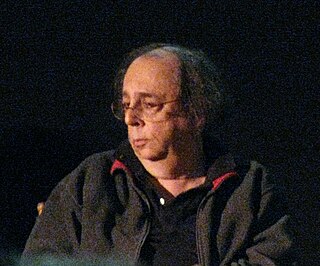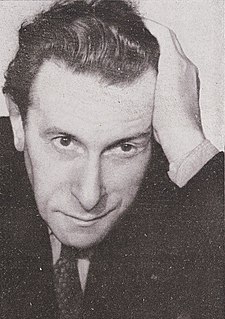Related Research Articles

Julian Beck was an American actor, stage director, poet, and painter. He is best known for co-founding and directing The Living Theatre, as well as his role as Kane, the malevolent preacher in the 1986 movie Poltergeist II: The Other Side. The Living Theatre and its founders were the subject of the 1983 documentary Signals Through The Flames.

Antoine Marie Joseph Paul Artaud, better known as Antonin Artaud, was a French writer, poet, dramatist, visual artist, essayist, actor and theatre director. He is widely recognized as one of the major figures of the European avant-garde. In particular, he had a profound influence on twentieth-century theatre through his conceptualization of the Theatre of Cruelty. Known for his raw, surreal and transgressive work, his texts explored themes from the cosmologies of ancient cultures, philosophy, the occult, mysticism and indigenous Mexican and Balinese practices.

The Living Theatre is an American theatre company founded in 1947 and based in New York City. It is the oldest experimental theatre group in the United States. For most of its history it was led by its founders, actress Judith Malina and painter/poet Julian Beck. After Beck's death in 1985, company member Hanon Reznikov became co-director with Malina; the two were married in 1988. After Malina's death in 2015, her responsibilities were taken over by her son Garrick Maxwell Beck. The Living Theatre and its founders were the subject of the 1983 documentary Signals Through the Flames.

Experimental theatre, inspired largely by Wagner's concept of Gesamtkunstwerk, began in Western theatre in the late 19th century with Alfred Jarry and his Ubu plays as a rejection of both the age in particular and, in general, the dominant ways of writing and producing plays. The term has shifted over time as the mainstream theatre world has adopted many forms that were once considered radical.

Judith Malina was a German-born American actress, director and writer. With her husband, Julian Beck, Malina co-founded The Living Theatre, a radical political theatre troupe that rose to prominence in New York City and Paris during the 1950s and 60s. The Living Theatre and its founders were the subject of the 1983 documentary Signals Through The Flames.

Richard Foreman is an American avant-garde playwright and the founder of the Ontological-Hysteric Theater.
A political drama can describe a play, film or TV program that has a political component, whether reflecting the author's political opinion, or describing a politician or series of political events.

Physical theatre is a genre of theatrical performance that encompasses storytelling primarily through physical movement. Although several performance theatre disciplines are often described as "physical theatre," the genre's characteristic aspect is a reliance on the performers' physical motion rather than, or combined with, text to convey storytelling. Performers can communicate through various body gestures.

Adolfas Mekas was a Lithuanian-born American filmmaker, writer, director, editor, actor and educator. With his brother Jonas Mekas, he founded the magazine Film Culture, as well as the Film-Makers' Cooperative and was associated with George Maciunas and the Fluxus art movement at its beginning. He made several short films, culminating in the feature Hallelujah the Hills in 1963, which was played at the Cannes Film Festival of that year and is now considered a classic of American film.
The Theatre of Cruelty is a form of theatre generally associated with Antonin Artaud. Artaud, who was briefly a member of the surrealist movement, outlined his theories in The Theatre and Its Double. The Theatre of Cruelty can be seen as a break from traditional Western theatre and a means by which artists assault the senses of the audience. Artaud's works have been highly influential on artists including Jean Genet, Jerzy Grotowski, Peter Brook, and Romeo Castellucci.

Shirley Clarke was an American filmmaker.
The Theatre and Its Double is a collection of essays by French poet and playwright Antonin Artaud. It contains his most famous works on the theatre, including his manifestos for a Theatre of Cruelty.
Stephen Robert Dixon is a British actor and academic.

Charles Dullin was a French actor, theater manager and director.
Tom Donaghy is an American playwright who works in television and film.
Jack Gelber was an American playwright best known for his 1959 drama The Connection, depicting the life of drug-addicted jazz musicians. The first great success of the Living Theatre, the play was translated into five languages and produced in ten nations. Gelber continued to work and write in New York, where he also taught writing, directing and drama as a professor, chiefly at Brooklyn College, City University of New York, where he created the MFA program in playwriting. In 1999 he received the Edward Albee Last Frontier Playwright Award in recognition of his lifetime of achievements in theatre.
The Connection is a 1959 play by Jack Gelber. It was first produced by the Living Theatre, directed by Living Theatre co-founder Judith Malina, and designed by co-founder Julian Beck. The play has a play-within-a-play format, with characters Jim Dunn as the "producer" and Jaybird as the "writer" attempting to stage a production about the underbelly of society using "real" addicts. Some of the addicts are jazz musicians. They all have one thing in common: they are waiting for their drug dealer, their "connection". The dialogue of the characters is interspersed with jazz music. The music for the original production was composed by jazz pianist Freddie Redd.
The Queen of Sheba Meets the Atom Man is a 1963 American experimental film directed by Ron Rice. It stars Winifred Bryan as the Queen of Sheba and Taylor Mead as the Atom Man. Featured players are Ron Rice, Julian Beck, Judith Malina, Jack Smith, and Jonas Mekas.
The Brig is a play written by Kenneth H. Brown (1936–2022) based on his experiences as a U.S. Marine. It was first performed in New York by The Living Theatre on May 13, 1963, with a production filmed in 1964 by Jonas Mekas. The Brig received three Obie Awards in 1964, for Best Production (play), Best Design and Best Direction.

Benn Northover is an English-Irish actor, director and artist.
References
- ↑ "Detail view of Movies Page". www.afi.com. Retrieved 7 February 2017.
- 1 2 3 Canby, Vincent (February 5, 1984). "SCREEN: AN INTRODUCTION TO THE LIVING THEATER". New York Times. Retrieved 11 January 2017.
- ↑ Artaud, Antonin (1958). The Theatre and its Double (1997 ed.). New York: Grove Press. p. 13. ISBN 978-0802150301.
- ↑ "The Legacy of Judith Malina and Julian Beck with The Living Theatre". thesegalcenter.org. Retrieved 7 February 2017.
- 1 2 Padla, Steven (2 September 2009). "THE LIVING THEATRE RETURNS TO NEW HAVEN" (PDF). Yale School of Drama. Retrieved 7 February 2017.